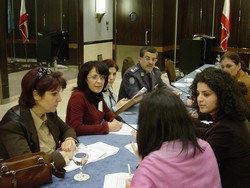 BEIRUT, 13 March (IRIN) – BEIRUT, 13 March 2006 (IRIN)
BEIRUT, 13 March (IRIN) – BEIRUT, 13 March 2006 (IRIN)
"The marginalisation of women in our society is a main reason women turn to prostitution…In some families, the girl isn’t allowed to make choices about work or study or decide who to marry," said Mansour. "So she runs away."
She added that girls often resorted to running away from home because of forced marriages, which is not prohibited by law, parental unwillingness to support girls’ education and forced work as domestic servants.
Meanwhile, abusers regularly go unpunished. Amal Ftouni, vice-president of the Lebanese Council to Resist Violence against Women, recalled taking a victim of domestic violence to the police: "Her face was black and blue after a beating from her husband. You should have seen the excuses they came up with not to file a report. They couldn’t find a piece of paper, the man who usually files them wasn’t there… they told her to just go home to her husband."
One woman at the centre said she ended up on the streets after her father tried to rape her. Several others described how they had been put to work as live-in maids, some younger than ten. Most were sexually abused as children. One said her parents sold her at the age of eight to work as a servant with a family who beat and burned her.
Jaqueline said she married at 18 to escape life with an aunt who wanted her to prostitute herself: "She said I must go out like her and sleep with Gulf and Saudi men for money," she said. "I didn’t want to."
Later, her husband turned violent, eventually throwing her out but keeping their five children: "I worked in a bar, selling myself," she said. "I had a boyfriend who took all the money I earned." One of her sons, she added, now follows his father’s example and beats his own wife.
Institutional discrimination
A damning 2004 report from US-based watchdog Human Rights Watch on women’s rights in the Middle East noted that inequality was institutionalised in Lebanon, pointing out that family matters tended to be governed by religion-based personal-status codes. "Many of these laws treat women essentially as legal minors under the eternal guardianship of their male family members," the study found. "They deny women equal rights with men with respect to marriage, divorce, child custody and inheritance."
These notions, the report stated, were supported by family courts in the region that often reinforce the primacy of male decision-making power. Legal discrimination, meanwhile, put women at increased risk of violence.
Although Lebanese women can theoretically file charges against violent family members, rights groups say few abused women are aware of their legal privileges. Many, they say, are too afraid of divorce, ostracism or having their children taken away to report attacks. Compounding matters, a commonly held perception is that female victims of domestic abuse must have "asked for it".
In 2002, the UN Population Fund conducted a three-month, nationwide survey of over 1,400 women aged between 14 and 80 years old. Of these, 494 – some 35 percent – had been exposed to some form of abuse, while 307 – 21 percent – knew of a family member who had been abused. In 65 percent of cases, the perpetrators were the husbands of the victim.
In 2005, police registered more than 2,844 reports of violence against women, including 31 rape cases, 177 attempted murders and 85 murders. Women’s groups, however, call these figures gross underestimations.
Parallel to this discrimination and violence, Dar al-Amal Director Hoda Kara believes that prostitution is also on the rise, although accurate statistics are non-existent. "Due to the economic crisis here, it’s getting worse," Kara says. "If economic and social difficulties increase, prostitution and [juvenile] delinquency also increase. If parents are in need, they might send their children to work – even to work as prostitutes."
Last year, Dar al-Amal counted 1,080 sex workers in Lebanon, although it believes many more work behind the scenes.
In the meantime, unemployment and economic deprivation continue to drive both supply and demand. "The marriage age is going up because sons don’t have the money to buy a house," explained Kara. "So men are living with their families for longer and some solve their sexual needs with prostitutes."
For women who find themselves forced into the illicit trade, there is seldom a way out. "The economic situation is difficult for all Lebanese," said Mansour. "Many are finding it hard to get a job – so how do we persuade a prostitute to stop work?"
ENDS

admin
BEIRUT, 13 March (IRIN) – BEIRUT, 13 March 2006 (IRIN)
BEIRUT, 13 March (IRIN) – BEIRUT, 13 March 2006 (IRIN)